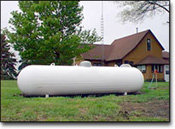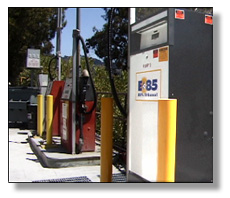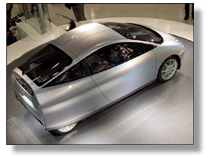News Bytes
California Passes Consumer Appliance Regulations
In December 2004, California regulators voted to force
 manufacturers to begin making their consumer electronics more energy efficient by 2006. The new regulations — which apply to appliances that use electricity even when they are turned off, such as DVD players, TVs, CD players, VCRs and telephone chargers — are the first of their kind in the world.
manufacturers to begin making their consumer electronics more energy efficient by 2006. The new regulations — which apply to appliances that use electricity even when they are turned off, such as DVD players, TVs, CD players, VCRs and telephone chargers — are the first of their kind in the world. Typically, these types of consumer electronics use between 2 and 10 watts when the product is turned off. The order, approved unanimously by the California Energy Commission, calls for a reduction to between 1 and 3 watts. And the power adapters that suck power even when the product is off may draw only 0.5 watts under the new regulations. Manufacturers must phase in these energy efficiency products in California by 2006 and comply fully by 2008.

In 2001, President Bush signed an executive order directing federal agencies to purchase devices that use 1 watt of power or less when on standby, or when turned off.
Study Shows Propane Contributes $30 Billion to U.S. Economy
Study of the Propane Industry’s Impact on the US. and State Economics, released in November 2004 by the National Propane Gas Association and the Propane Education & Research Council, found the propane industry is adding more than $30 billion to the American economy and its Gross Domestic Product and more than 56,000 American jobs. Energy and Environmental Analysis completed the study using 2002 data.
 The study also showed the propane industry contributes more than $192 million a year and 391 jobs to Nebraska’s economy, of which 292 jobs are in the retail sector. According to the 2000 census, approximately 68,760 homes — more than 10.3 percent of all homes in the state — are heated with propane.
The study also showed the propane industry contributes more than $192 million a year and 391 jobs to Nebraska’s economy, of which 292 jobs are in the retail sector. According to the 2000 census, approximately 68,760 homes — more than 10.3 percent of all homes in the state — are heated with propane.
Study Shows Ethanol Adds $25 Billion to Nation’s Economy
In February, the Renewable Fuels Association released the ethanol industry outlook for 2005,
Homegrown for the Homeland
According to the study:
- The ethanol industry added more than $25 billion to the nation’s gross economic output
 through operating spending and capital spending for new plants.
through operating spending and capital spending for new plants.
- The ethanol industry supported over 147,000 jobs across all sectors of the economy.
- $4.4 billion went directly to consumers this past year through increased economic activity and new jobs.
- Federal and state governments collected almost $2.5 billion in additional tax revenues.
- U.S. trade deficit was reduced by $5.1 billion as oil imports were reduced by 143.3 million barrels.
In Nebraska, according to the Nebraska Ethanol Board, the ethanol industry has had a number of impacts:
- The 11 operating plants have the capacity to produce more than 500 million gallons of ethanol and related products a year.
- Six additional plants are under construction.
- An estimated $1.4 billion in capital investment has been spent to build the 11 operating plants.
- About 1,000 Nebraskans are employed full-time in the state’s ethanol facilities representing an estimated annual payroll of $45 million. There are another 4,500 jobs in industries that support the plants.
Soy-Based Products Help Homestead Monument Live Off the Land

Homestead National Monument in Beatrice is staying true to the spirit it commemorates by using soybean-based two-cycle oil and lubricants donated by the Soybean Checkoff Program.
The donation is part of a cooperative program with the National Park Foundation. This program provides several different types of soy-based products to 11 national parks across the country. Adding to their tradition of using renewable resources, the Soybean Checkoff Program donated several other products including hydraulic fluid, general purpose lubricating oil, and bar and chain oil.
“We have been able to use the soybean-based products in a variety of our maintenance applications from our weed-whip to our tractors,” says Mark Engler, Superintendent of Homestead National Monument. “We have been able to replace our traditional products without any need for equipment modifications.” Park staff has reported a reduction in soot emissions as well as an equal performance to their previous petrochemical-based products. Soybean research has shown that by using soy-based lubricants such as crankcase oils in vehicles, harmful emissions such as carbon monoxide and hydrocarbons are greatly reduced. When compared with petrochemical-based oil, soybean oil lubricants have higher viscosity index, lower evaporation loss and potential to enhance lubricity.
“Our park is a tribute to courage and tenacity,” says Engler. “Those qualities are exemplified by using environmentally friendly and renewable, U.S.-grown, soy-based products. It also helps when those products perform better than or equal to our previous ones.”
Americans See Fuel Efficient Cars as “Patriotic”
Most Americans believe it is "patriotic" to buy a fuel-efficient vehicle to help wean their country from Middle Eastern oil, according to a February 2005 poll by Civil Society Institute, a nonpartisan think tank.

Some 66 percent of participants in the survey said they agreed that driving vehicles that require less fuel to run was patriotic. The poll also showed that 57 percent of self-described conservatives considered the purchase of a fuel-efficient vehicle an act of patriotism. Even 67 percent of NASCAR racing fans concurred that fuel-efficiency and patriotism go hand in hand, the poll found.
The poll also found that 89 percent of Americans agreed on the importance of government action to reach a 40 mile per gallon fuel efficiency level for US vehicles, to cut greenhouse pollution as well as dependency on Mideast oil. In response to rising gasoline prices, 50 percent of those surveyed said they had already purchased or were considering buying a more fuel-efficient car.
The poll was based on telephone interviews with 1,013 adults and conducted between February 10-13, 2005. The poll’s margin for error was three percentage points.